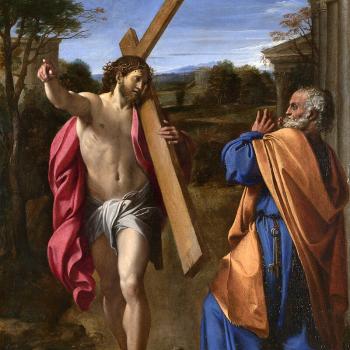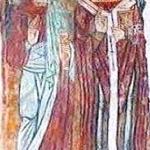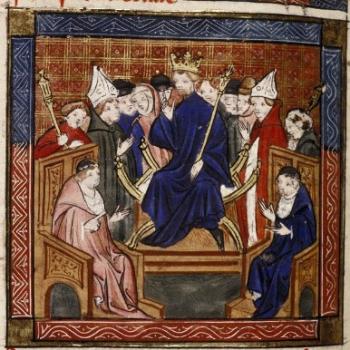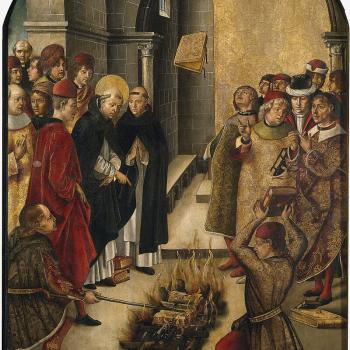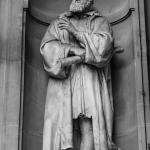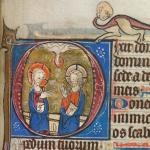![]()
The dual apostolicity of the Roman church was a fact well known to the Early Church Fathers. Not only did Peter and Paul labor there, but they were also ultimately martyred in the imperial capital making their residence permanent in a certain sense.[1] This apostolic pedigree became a useful tool for second and third century apologists such as Irenaeus of Lyons and Gaius in combatting Gnosticism.[2] Thus the appearance of the first extant episcopal lists of the bishops of Rome around this time.[3] However, given what is known about the Roman church from earlier sources, – especially St. Paul’s Epistle to the Romans (ca. A.D. 57) – at least one modern historian has questioned the witness of these two early churchmen.
The question that this article raises is in what sense did these two authors mean that Sts. Peter and Paul “founded” the Roman church? Since it can be gathered from the Epistle to the Romans that Paul had not yet been there, that Peter was not there at that time (or had not been there yet), and that there was already an existing Christian community there,[4] the question remains whether these two early witnesses were mistaken, or whether they meant that the two Apostles “founded” the church in Rome in a qualified sense.
The first, St. Irenaeus, was a Greek Father who became the bishop of Lyon in France. He composed his well known Against Heresies (ca. A.D. 189) in order to counter the various sects of Gnosticism that were numerous in his time, which all threatened the Apostolic preaching. In Book III, chapter 4 he says the following:
“2. Since, however, it would be very tedious, in such a volume as this, to reckon up the successions of all the Churches, we do put to confusion all those who, in whatever manner, whether by an evil self-pleasing, by vainglory, or by blindness and perverse opinion, assemble in unauthorized meetings; [we do this, I say,] by indicating that tradition derived from the apostles, of the very great, the very ancient, and universally known Church founded and organized at Rome by the two most glorious apostles, Peter and Paul; as also [by pointing out] the faith preached to men, which comes down to our time by means of the successions of the bishops. For it is a matter of necessity that every Church should agree with this Church, on account of its preeminent authority [potiorem principalitatem].
3. The blessed apostles, then, having founded and built up the Church, committed into the hands of Linus the office of the episcopate.”[5]
The question of Roman primacy aside, in what sense was does Irenaeus mean that Peter and Paul “founded” the Roman church? “Here…”, writes Oscar Cullmann, “occurs at least one error: the Roman church in any case was not founded by Paul”. He goes on to refer to the Epistle to the Romans as evidence, and asserts that “this at once calls in question the historical trustworthiness of the statement”. While Cullmann is discussing literary sources on the subject of Peter’s martyrdom (of which he points out this text says nothing),[6] it seems that he has taken the word “founded” in the strict sense here.
Daniel O’Connor gives a more nuanced interpretation on the concept that this community was “founded” by an Apostle. “The relation of Peter to the founding of such a community would be then”, he asserts, “little more than the giving of the apostolic blessing to what had already taken place”.[7] In a similar vein, Robert Eno actually goes further and hits the nail on the head: “If by founder is meant that Peter was the first preacher of Christianity in Rome, then Peter should not be called the founder. He no doubt also [like Paul] arrived in a pre-existing Christian community in Rome. But they, Peter and Paul, are still considered the founders, the foundational stones, of the Roman Church in a moral, if not absolutely literal, historical sense”.[8]
To my mind, this approximates what Irenaeus means above by stating that Peter and Paul “founded and built up the Church” in Rome. Surely he could not have been more ignorant than moderns about the origins of the Roman community? He too had access to the Epistle of the Romans, and he was in communication with Pope Victor during the Quartodeciman Controversy. It seems reasonable that he would be well aware of the origins of the Roman church, was familiar with its apostolic pedigree (as were his contemporaries), and utilized that in his argument against his gnostic opponents.
It is in this same sense that I believe Gaius makes an identical claim. In his Disputation with Proclus (ca. A.D. 198/ 217), which is preserved in Eusebius, he writes that he “can point out the trophies of the Apostles. For if you are willing to go to the Vatican or the Ostian Way, you will find the trophies of those who founded this Church”.[9] Here Gaius is countering an argument from his opponent that Hierapolis could claim the relics of Philip (and his daughters).[10] Gaius receives a similar comment from Cullmann that Irenaeus did, when he writes that “this statement, in spite of its historical inaccuracy had become a fixed tradition”.[11] It seems more reasonable to conclude that both authors (and the tradition) are not speaking of a foundation in the strict sense, but rather of one like Eno suggests above. This accords with the words of Tertullian (d. A.D. 220), who wrote of Rome: “How happy is its church, on which apostles [i.e Peter and Paul] poured forth all their doctrine along with their blood!”[12]
[1] Robert Eno, The Rise of the Papacy (Eugene: Wipf and Stock, 1990), 25; Tertullian, Prescription against Heretics, ch. 36.
[2] Daniel O’Connor, Peter in Rome: The Literary, Liturgical, and Archeological Evidence (New York: Columbia University Press, 1969), 29, 95-96. Cf. Oscar Cullmann, Peter: Disciple, Apostle, Martyr, trans. Floyd V. Filson (Waco: Baylor University Press, 2011), 117.
[3] O’Connor, Peter in Rome, 28-29.
[4] O’Connor, Peter in Rome, 8-10
[5] Translated by Alexander Roberts and William Rambaut. From Ante-Nicene Fathers, Vol. 1. Edited by Alexander Roberts, James Donaldson, and A. Cleveland Coxe. (Buffalo, NY: Christian Literature Publishing Co., 1885.) Revised and edited for New Advent by Kevin Knight. <http://www.newadvent.org/fathers/0103303.htm>. Retrieved 10/8/2022. My emphasis.
[6] Cullmann, Peter, 116.
[7] O’Connor, Peter in Rome, 10. The passage of Irenaeus is not under discussion here it should be pointed out. Rather, it is the Epistle to the Romans.
[8] Eno, Rise of the Papacy, 18.
[9] In William Jurgens, Faith of the Early Fathers Vol. 1 (Collegeville, The Liturgical Press, 1970), 44. My emphasis.
[10] O’Callaghan, Peter in Rome, 96-97. For a discussion on the meaning of “trophies” in this text see pp.97-101. Cf. Cullmann, Peter, 117-121.
[11] Cullmann, Peter, 117-118.
[12] Prescription against Heretics, ch. 36. Translated by Peter Holmes. From Ante-Nicene Fathers, Vol. 3. Edited by Alexander Roberts, James Donaldson, and A. Cleveland Coxe. (Buffalo, NY: Christian Literature Publishing Co., 1885.) Revised and edited for New Advent by Kevin Knight. <http://www.newadvent.org/fathers/0311.htm>. Accessed 10/8/2022.







